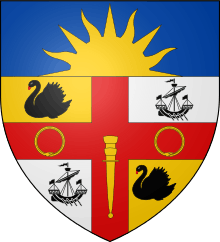Royal Australasian College of Surgeons
The Royal Australasian College of Surgeons (RACS) is the leading advocate for surgical standards, professionalism and surgical education in Australia and New Zealand. The head office of the College is in Melbourne, Australia.
The College is a not-for-profit organisation that represents more than 7000 surgeons and 1300 surgical trainees and International Medical Graduates. RACS also supports healthcare and surgical education in the Asia-Pacific region and is a substantial funder of surgical research.
RACS was formed in 1927 as the Australian College of Surgeons, and its prime purpose, as outlined by the Medical Journal, was to "enable the public to distinguish between surgeons and men who undertake operations".[1] Its major roles are in training surgeons, continuing education, and setting standards for surgical practice. The members of the College fall into the following categories: Fellows (who possess the fellowship of the College - FRACS), Trainees (doctors training to be surgeons) and IMGs (International Medical Graduates). The College is independent from government and universities and is funded through fees paid by Trainees and Fellows.
The College trains in nine surgical specialty areas:
- Cardiothoracic surgery
- General surgery
- Neurosurgery
- Orthopaedic surgery
- Otolaryngology head and neck surgery
- Paediatric surgery
- Plastic and reconstructive surgery
- Urology
- Vascular surgery
Some surgical specialties receive their training from separate colleges, these include: ophthalmic surgeons who are examined by the Royal Australian and New Zealand College of Ophthalmologists (RANZCO), oral and maxillofacial surgeons who are examined by the Royal Australasian College of Dental Surgeons (RACDS), and obstetric and gynecological surgeons who are examined by the Royal Australian and New Zealand College of Obstetricians and Gynaecologists (RANZCOG).
The major activities of the College are surgical training and examination, setting standards for surgical practice, continuing professional development and government and media relations. The Surgical Education and Training (SET) program has improved the efficiency of surgical education and training through early selection into specialty training and streamlining training.
Arms
 |
|
See also
- Category:Fellows of the Royal Australasian College of Surgeons - fellows with Wikipedia articles about them
- Basic sciences examination
References
- ↑ "Just So". The Register (Adelaide). XCII, (26, 788). South Australia. 25 June 1927. p. 7. Retrieved 20 May 2018 – via National Library of Australia.
- ↑ http://www.surgeons.org/media/295924/College_Arms_Background.pdf
- ↑ http://www.surgeons.org/media/295924/College_Arms_Background.pdf
External links
- Official website of RACS